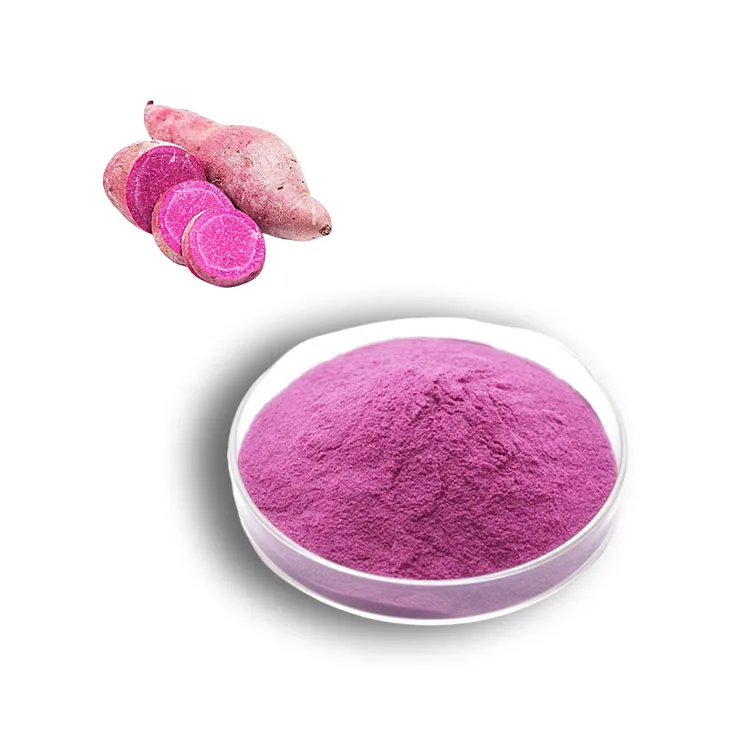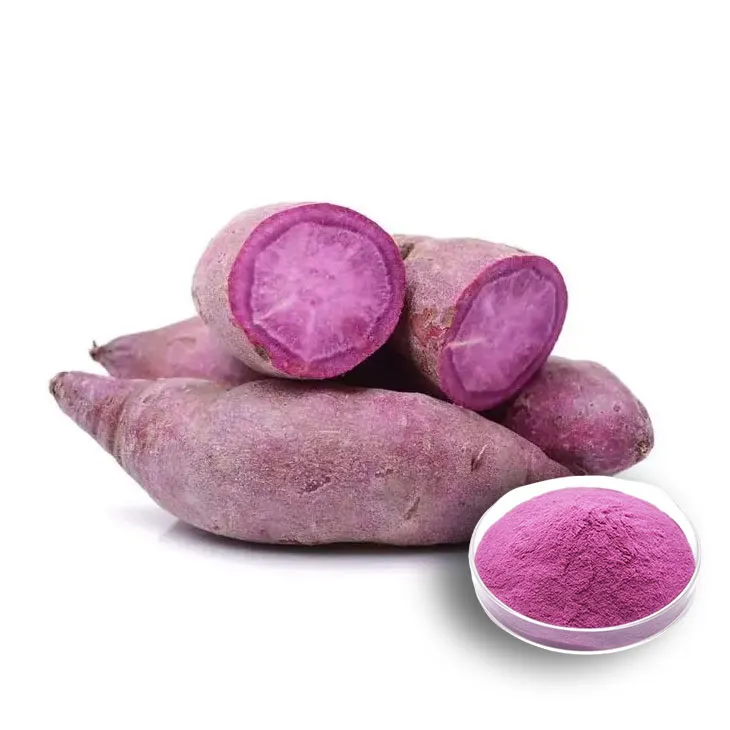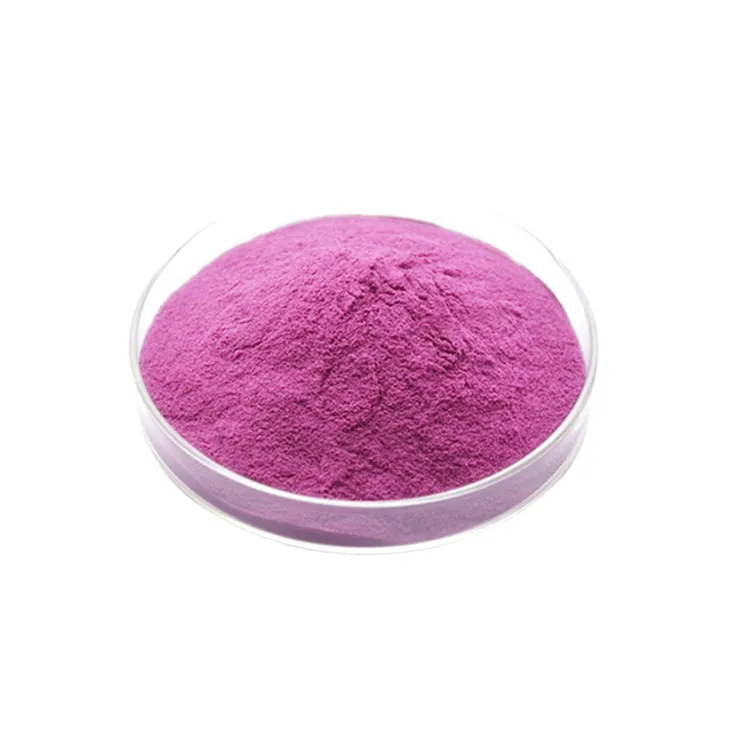- 0086-571-85302990
- sales@greenskybio.com
Is purple sweet potato extract beneficial for diabetes? Are these all safe and applicable for diabetic patients?
2024-11-12

1. Introduction
Diabetes has become a global health concern, and the search for natural substances that can manage or improve the condition is ongoing. Purple Sweet Potato Extract has recently emerged as a potential candidate. This article aims to comprehensively analyze whether Purple Sweet Potato Extract is beneficial for diabetes and its safety for diabetic patients.

2. Composition of Purple Sweet Potato Extract
The purple sweet potato is rich in various bioactive components. Anthocyanins are one of the most prominent constituents in the purple sweet potato extract. These are powerful antioxidants that give the purple sweet potato its characteristic color. Anthocyanins have been associated with several health - promoting properties.
Another important component is dietary fiber. Dietary fiber in purple sweet potato extract can be classified into soluble and insoluble fiber. Soluble fiber has the potential to slow down the digestion and absorption of carbohydrates, which is of particular interest in the context of diabetes management.

3. Potential Benefits for Diabetes
3.1 Blood Glucose Regulation
The soluble fiber in purple sweet potato extract can form a gel - like substance in the digestive tract. This slows down the breakdown and absorption of sugars, leading to a more gradual increase in blood glucose levels after a meal. In addition, some studies suggest that anthocyanins may enhance insulin sensitivity. Insulin is the hormone responsible for regulating blood glucose, and improved sensitivity means that the body can use insulin more effectively to lower blood sugar levels.
3.2 Antioxidant Effects
Diabetes is often associated with increased oxidative stress. The high levels of anthocyanins in purple sweet potato extract act as antioxidants, scavenging free radicals in the body. By reducing oxidative stress, it may help prevent or delay some of the complications associated with diabetes, such as diabetic neuropathy, retinopathy, and nephropathy. Free radicals can damage cells and tissues, and antioxidants play a crucial role in neutralizing them.
3.3 Weight Management
The dietary fiber in purple sweet potato extract can increase satiety, making individuals feel fuller for longer periods. This can potentially lead to a reduction in overall calorie intake, which is beneficial for diabetic patients, as many of them are overweight or obese. Maintaining a healthy weight is an important aspect of diabetes management, as excess weight can exacerbate insulin resistance.

4. Safety Considerations
4.1 Allergic Reactions
Although relatively rare, some individuals may be allergic to purple sweet potatoes. Allergic reactions can range from mild symptoms such as itching and rash to more severe manifestations like difficulty breathing and anaphylactic shock. Diabetic patients should be cautious when starting to use purple sweet potato extract and monitor for any signs of allergic reactions.
4.2 Interaction with Medications
There is a possibility that purple sweet potato extract may interact with certain medications used to treat diabetes, such as metformin or sulfonylureas. It could potentially enhance or interfere with the action of these drugs. For example, if it further lowers blood glucose levels in combination with medications, it may increase the risk of hypoglycemia (low blood sugar). Diabetic patients should consult their healthcare providers before adding purple sweet potato extract to their regimen to ensure there are no adverse interactions.
4.3 Purity and Quality of Extracts
The market for dietary supplements, including purple sweet potato extract, is not always well - regulated. There may be variations in the purity and quality of different products. Low - quality extracts may contain contaminants or have inaccurate labeling regarding the amount of active ingredients. Diabetic patients should choose products from reliable sources to ensure they are consuming a safe and effective supplement.

5. Research Evidence
Several studies have been conducted on the effects of purple sweet potato extract on diabetes. In animal studies, results have shown promising effects on blood glucose regulation and antioxidant activity. For example, a study on diabetic rats found that purple sweet potato extract supplementation led to a significant reduction in fasting blood glucose levels over a period of weeks.
However, human studies are still relatively limited. Some small - scale human trials have reported positive trends in blood glucose control and improved lipid profiles among diabetic patients taking purple sweet potato extract. But more large - scale, long - term human studies are needed to firmly establish its effectiveness and safety for diabetes management.
6. Dietary Recommendations
If diabetic patients decide to incorporate purple sweet potato extract into their diet, it should be done as part of a balanced diet. Purple sweet potato extract should not be considered a substitute for medical treatment, but rather a complementary approach.
- It is recommended to start with a small dose and gradually increase it while monitoring blood glucose levels and any potential side effects.
- Patients should also continue to follow their regular dietary guidelines for diabetes, which typically include controlling carbohydrate intake, increasing vegetable consumption, and choosing healthy fats.
7. Conclusion
Purple sweet potato extract shows potential benefits for diabetes in terms of blood glucose regulation, antioxidant effects, and weight management. However, safety considerations such as allergic reactions, potential interactions with medications, and the quality of the extract must be taken into account. While there is some research evidence supporting its use, more comprehensive human studies are required. Diabetic patients should consult their healthcare providers before using purple sweet potato extract to ensure its safety and effectiveness in their individual cases.
FAQ:
1. What is purple sweet potato extract?
Purple sweet potato extract is a substance obtained from purple sweet potatoes. It contains various components such as anthocyanins, dietary fiber, and some vitamins and minerals. The anthocyanins are pigments that give the purple sweet potato its characteristic color and are also believed to have certain biological activities.
2. How could purple sweet potato extract potentially benefit diabetes?
Some studies suggest that the anthocyanins in purple sweet potato extract may have antioxidant properties. Antioxidants can help reduce oxidative stress in the body, which is often elevated in diabetic patients. Also, the dietary fiber in it may slow down the absorption of carbohydrates, thus helping to regulate blood sugar levels. However, more research is still needed to fully confirm these potential benefits.
3. Are there any risks associated with purple sweet potato extract for diabetic patients?
While purple sweet potato extract is generally considered safe, some people may be allergic to it. Also, if it is consumed in excessive amounts, it could potentially cause digestive problems such as bloating or diarrhea. Moreover, if it is used as a supplement, there may be issues related to quality control and potential contaminants in some products.
4. How much purple sweet potato extract can a diabetic patient consume safely?
There is currently no specific recommended dosage for purple sweet potato extract for diabetic patients. It is best to consult a healthcare provider or a registered dietitian. They can take into account the individual's overall health, diet, and existing medications to determine a safe amount, if any, that can be consumed.
5. Can purple sweet potato extract replace diabetes medications?
No. Purple sweet potato extract should not be used to replace diabetes medications. While it may have some potential benefits for blood sugar regulation, it has not been proven to be as effective as medications in controlling diabetes. Diabetic patients should always follow their doctor's advice regarding medication use and only use supplements like purple sweet potato extract as a complementary approach under medical supervision.
Related literature
- The Role of Anthocyanins from Purple Sweet Potato in Diabetes Management"
- "Purple Sweet Potato Extract: Potential Health Benefits and Safety Considerations for Diabetic Patients"
- "Dietary Supplements and Diabetes: A Review with Focus on Purple Sweet Potato Extract"
- ▶ Hesperidin
- ▶ citrus bioflavonoids
- ▶ plant extract
- ▶ lycopene
- ▶ Diosmin
- ▶ Grape seed extract
- ▶ Sea buckthorn Juice Powder
- ▶ Beetroot powder
- ▶ Hops Extract
- ▶ Artichoke Extract
- ▶ Reishi mushroom extract
- ▶ Astaxanthin
- ▶ Green Tea Extract
- ▶ Curcumin Extract
- ▶ Horse Chestnut Extract
- ▶ Other Problems
- ▶ Boswellia Serrata Extract
- ▶ Resveratrol Extract
- ▶ Marigold Extract
- ▶ Grape Leaf Extract
- ▶ blog3
-
Cranberry Plants and Skin - care Products.
2024-11-12
-
Acai Berry Extract
2024-11-12
-
Yam Extract
2024-11-12
-
Marigold Extract
2024-11-12
-
Hawthorn Extract
2024-11-12
-
Beta Carotene
2024-11-12
-
Chia Seed Powder
2024-11-12
-
Dandelion Leaf Extract
2024-11-12
-
Sophora Japonica Flower Extract
2024-11-12
-
Lily extract
2024-11-12
-
Stevia Extract
2024-11-12





















